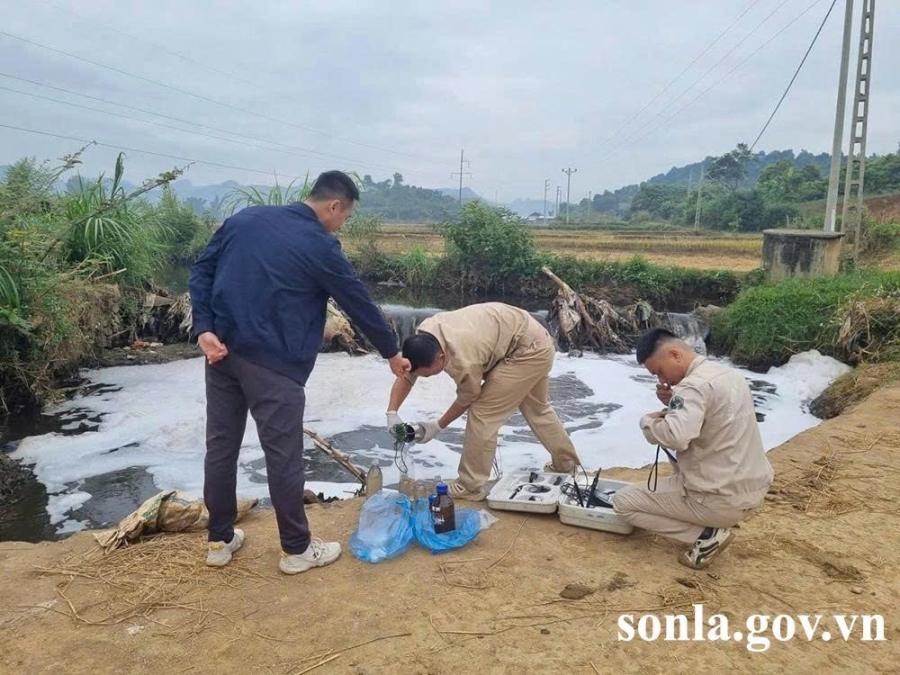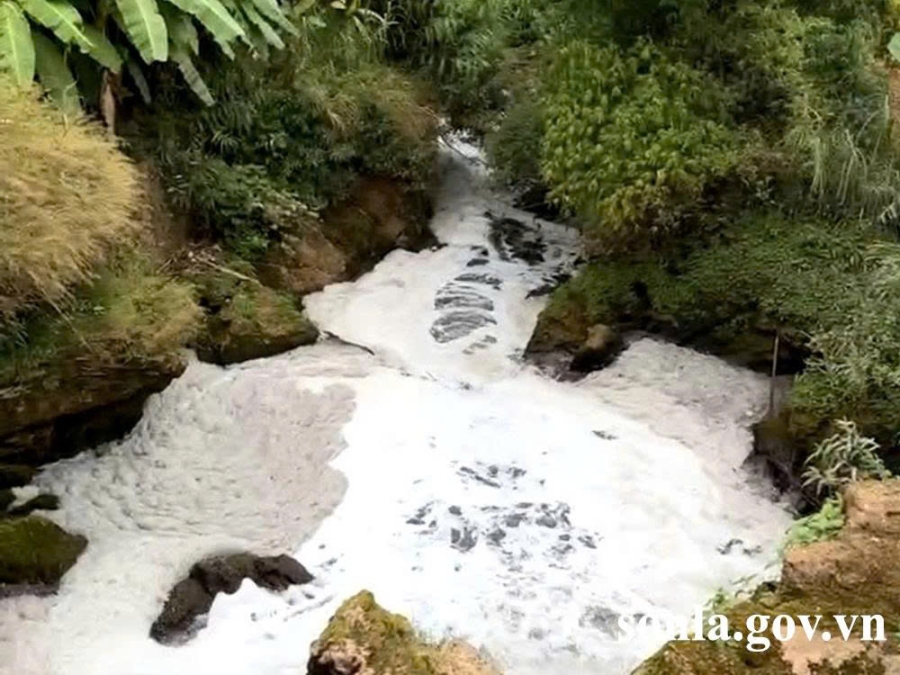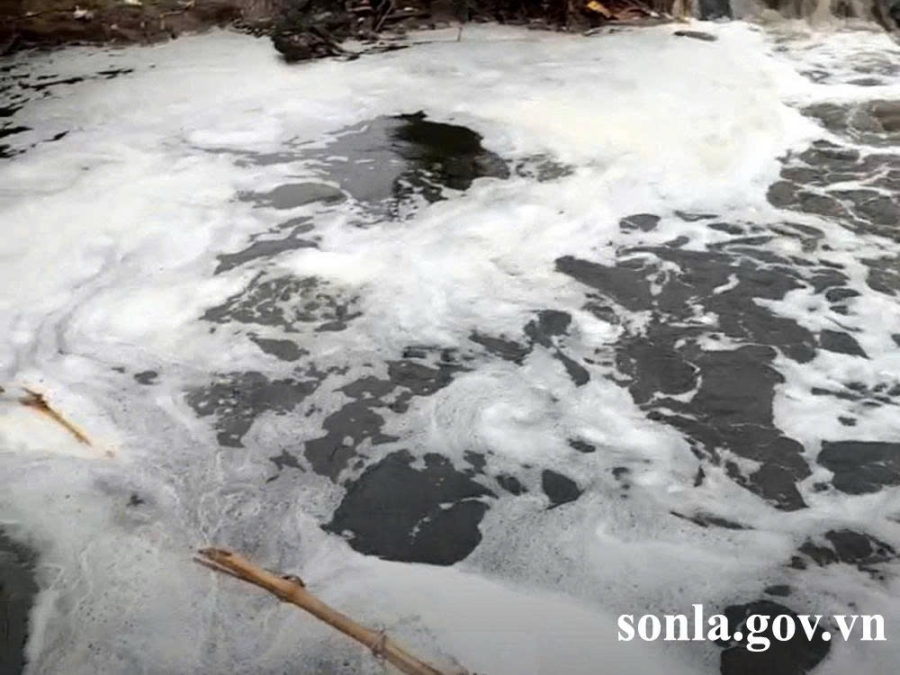Currently, the 2025–2026 coffee crop year has entered its peak season. Based on monitoring results of the environmental quality status in the communes of Chiềng Mai, Chiềng Mung, and several adjacent communes and wards, air and surface water pollution has occurred due to coffee processing activities, affecting residents’ lives. According to the inspection and verification results dated 26 October 2025 by the Department of Agriculture and Environment and the People’s Committees of Chiềng Mai and Chiềng Mung communes, the water in Bung Bông stream—from the section flowing from Chiềng Mai commune (formerly Chiềng Ban) through Chiềng Sinh ward to Chiềng Mung commune—appears black, emits a foul odor, and has white foam. The cause has been identified as untreated wastewater from preliminary coffee processing activities of households being discharged directly into the environment.
The Department of Agriculture and Environment issued Official Letter No. 5241/SNN&MT-QLMT dated 26 October 2025 “on the implementation of measures to remedy environmental pollution caused by preliminary processing and processing of fresh coffee in Chiềng Mung and Chiềng Mai communes.” The letter clearly states: “In all cases, it is strictly prohibited to discharge untreated wastewater into the environment, causing environmental pollution. The chairperson of the People’s Committee at the commune level shall be responsible before the law and before the Chairperson of the Provincial People’s Committee in the event that environmental pollution or water source pollution occurs due to the operations of coffee processing facilities that fail to meet environmental protection requirements,” and “resolutely suspend production activities and impose sanctions on facilities that lack legal environmental protection documentation as required, or do not have collection, storage, and treatment systems or measures for waste (wastewater, coffee husks) appropriate to their scale and capacity, ensuring treatment meets technical environmental standards.”
To thoroughly remedy the environmental pollution caused by preliminary processing and processing of fresh coffee in Chiềng Mai and Chiềng Mung communes (and adjacent communes and wards), the Department of Agriculture and Environment proposes that the Provincial Police Department direct its specialized units and commune-level police to intensify preventive measures, detection, combat, prevention, and strict handling of violations of environmental protection laws in coffee processing activities throughout the province, particularly in Chiềng Mai and Chiềng Mung communes, as well as Chiềng Cơi and Chiềng Sinh wards.

Functional forces collect stream water samples.
The Department also requests the People’s Committees of the wards and communes of Chiềng Cơi, Chiềng Sinh, Chiềng Mai, and Chiềng Mung to continue fully implementing the tasks and environmental protection measures for agricultural product processing activities as directed by the Chairperson of the Provincial People’s Committee in Section 6 of Official Letter No. 1179/UBND-KT dated 21 March 2025; to direct specialized departments to coordinate with commune-level police forces to conduct a comprehensive review and inspection of all preliminary coffee processing and processing activities in their respective areas; and to resolutely suspend production activities and impose sanctions on facilities that lack legal environmental protection documentation as required or do not have collection, storage, and treatment systems or measures for waste (wastewater, coffee husks) appropriate to their scale and capacity, ensuring treatment meets technical environmental standards. For facilities that meet operational conditions, regular and continuous inspections and monitoring shall be conducted on all production activities (scale, capacity, operating hours, etc.) and the effectiveness of waste collection, storage, and treatment systems. In cases where storage ponds no longer have the capacity to collect and store wastewater, production and processing of fresh coffee must be immediately suspended. In all cases, it is strictly prohibited to discharge untreated wastewater into the environment, causing pollution. The chairperson of the commune-level People’s Committee shall be responsible before the law and before the Chairperson of the Provincial People’s Committee in the event of environmental or water source pollution caused by coffee processing facilities that fail to meet environmental protection requirements.
In the event of pollution, emergency response measures must be promptly implemented to remedy the pollution, restore the environment, and address the incident. Where organizations or individuals responsible for causing environmental pollution and damage are identified, they must be required to fulfill their compensation responsibilities, cover all costs of damage assessment, and follow legal procedures for compensation claims. Continuous monitoring and assessment of the environmental status (surface water, groundwater, etc.) and the intended uses of streams flowing through the area (domestic use, agricultural irrigation) must be conducted. Based on this, solutions must be developed to remedy pollution and restore the environment to ensure water meets its designated purposes. Where necessary, alternative water sources must be secured to meet community needs. If water quality assessment is required, proactively contact the Department of Agriculture and Environment or the Center for Water and Environmental Monitoring for support in implementation. Public awareness campaigns, guidance, and warnings must be provided to households and individuals regarding the use of stream water for agricultural and aquaculture purposes; in cases where water shows signs of pollution, it must absolutely not be diverted into aquaculture ponds. For fish ponds already showing signs of pollution leading to fish deaths, guide owners to implement sanitation, disinfection, dredging, or water filtration measures to enable continued use for aquaculture.
The official letter also states: Sơn La Water Supply Joint Stock Company (the domestic water supply unit) must enhance monitoring and evaluation of source water quality for urban domestic water supply in Chiềng Sinh ward and adjacent communes (Km 13 well, Tổ 7 well in Chiềng Sinh ward, Nà Sản water station, etc.); promptly implement response procedures and plans, and ensure readiness of remedial conditions in case of source water pollution incidents to guarantee water security for domestic use; develop plans to exploit alternative water sources (or supplement water supply) in case of pollution incidents affecting currently exploited domestic water sources; and accelerate the completion of legal procedures and investment to construct and operationalize the Chiềng Dong Water Plant to supply domestic water to adjacent wards and communes, ensuring residents’ water needs.
For large-scale coffee processing facilities in the province: During production, fully comply with environmental protection requirements as stipulated in the approved environmental impact assessment report, wastewater discharge permit, and environmental permit issued by competent authorities; operate wastewater and emissions treatment systems to ensure treatment meets technical environmental standards before discharge into the environment; under no circumstances discharge untreated waste causing environmental pollution; organize the collection of all runoff rainwater, domestic waste, and ordinary industrial solid waste generated from production activities in accordance with procedures; and enhance the purchase and processing of fresh coffee within the plant’s designed capacity to help absorb the fresh coffee output of households and individuals throughout the province.
Source: https://sonla.gov.vn/
Son La Province Electronic Information Portal
























